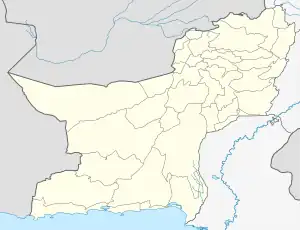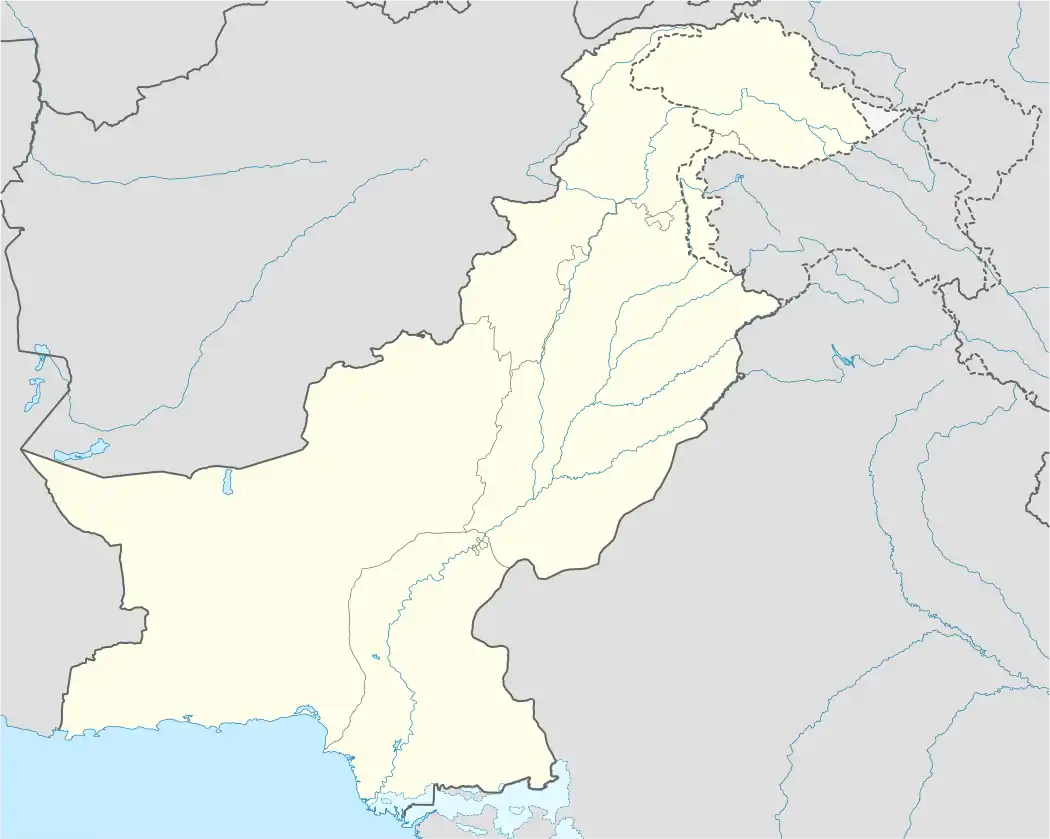Mastung مستونگ | |
|---|---|
 Mastung مستونگ  Mastung مستونگ | |
| Coordinates: 29°47′56″N 66°50′50″E / 29.79889°N 66.84722°E | |
| Country | |
| Province | |
| Division | Kalat |
| District | Mastung |
| Elevation | 1,701 m (5,581 ft) |
| Population | |
| • Total | 35,129 |
| Time zone | UTC+5 (PST) |
| Number of Union councils | 2 |
Mastung (Balochi and Urdu: مستونگ), the capital of Mastung District, is a town in the Balochistan province of Pakistan. It has an altitude of 1701 metres (5583 feet).[2] The town is also the administrative centre of Mastung Tehsil, an administrative subdivision of the district – the town itself is administratively subdivided into two Union Councils.
Mastung is located in Sarawan which is a division of the princely state of Kalat, the Chief Of Sarawan himself is from Mastung.
History
Mastung was known to the 10th-century geographers al-Muqaddasi and Istakhri, who both listed it among the towns in the province of Bālis, also called Bālish or Wālishtān, whose capital was Sibi.[3]
The Ain-i-Akbari, written during the reign of the Mughal emperor Akbar in the late 1500s, lists Mastung as one of the 24 mahals included in the Sarkar of Kandahar. At that time, Mastung was defended by a mud brick fort and produced a yearly revenue of 10 tumans and 8,000 dinars in cash alongside 470 kharwars of grain. Its population was a mixture of Afghans and Balochs.[4]
The 2017 Mastung suicide bombing killed 28 and injured 40. A 2018 suicide bombing killed 149 and injured 186. The town was once again the site of a suicide bombing in 2023.
Demography
There are numerous Baloch as well as Pashtun tribes populated in Mastung, the tribes include Bangulzai, Shahwani, Pirkani, Sarpara, Raisani (Tareen) and Muhammad Shahi, which are the most common tribes and are politically active and leading in the area other tribes include Dehwar, Lehri, Satakzai, Bangulzai, Tareen, Ali Zai and several more.[5]
Religion
| Religious group |
1941[6]: 13–14 | 2017[7][8] | ||
|---|---|---|---|---|
| Pop. | % | Pop. | % | |
| Islam |
2,963 | 94.36% | 34,369 | 98.21% |
| Hinduism |
124 | 3.95% | 416 | 1.19% |
| Sikhism |
28 | 0.89% | — | — |
| Christianity |
25 | 0.8% | 201 | 0.57% |
| Others | 0 | 0% | 11 | 0.03% |
| Total population | 3,140 | 100% | 34,997 | 100% |
Languages
The two main languages spoken by the Baloch in Mastung are Brahui and Baluchi.
See also
Notes
- ↑ "Balochistān (Pakistan): Province, Major Cities, Municipalites [sic] & Towns - Population Statistics, Maps, Charts, Weather and Web Information".
- ↑ Location of Mastung – Falling Rain Genomics
- ↑ Le Strange, Guy (1905). The Lands of the Eastern Caliphate: Mesopotamia, Persia, and Central Asia, from the Moslem Conquest to the Time of Timur. New York: Barnes & Noble, Inc. pp. 347–348. OCLC 1044046.
- ↑ Abu'l-Fazl ibn Mubarak; Jarrett, Henry Sullivan (translator) (1891). The Ain-i-Akbari. Calcutta: Asiatic Society of Bengal. p. 397. Retrieved 29 May 2020.
{{cite book}}:|first2=has generic name (help) - ↑ "Tehsils & Unions in the District of Mastung – Government of Pakistan". Archived from the original on February 9, 2012.
- ↑ "CENSUS OF INDIA, 1941 VOLUME XIV BALUCHISTAN". Retrieved 27 January 2023.
- ↑ "Final Results (Census-2017)". Retrieved 27 January 2023.
- ↑ "District Wise Results / Tables (Census - 2017) TABLE 9 - POPULATION BY SEX, RELIGION AND RURAL/URBAN" (PDF). Retrieved 27 January 2023.